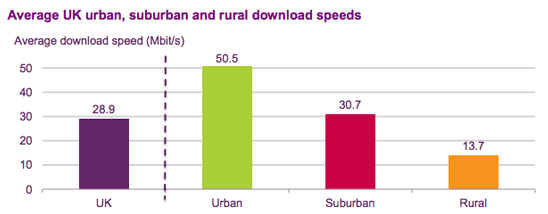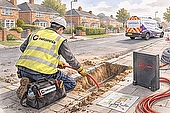Home > Broadband > News > Housing crisis won't end without action on broadband gap
Housing crisis won't end without action on broadband gap
THE British Chamber of Commerce (BCC) have released figures showing that poor broadband is holding back rural businesses, with the latter twice as likely to experience unreliable internet connections as urban firms.

Yet the disadvantages they encounter are also faced not just by rural communities as a whole, but by many areas of the UK outside of the South East, with past research funded by the Economic and Social Research Council (ESRC) testifying to a significant "digital divide" between the South and the North of Britain.
And at a time when the Social Mobility Commission have just concluded that homes are now so expensive in certain parts of the country that over a third of first-time buyers need to rely on the Bank of Mum and Dad to buy their homes, the existence of marked regional differences in broadband provision suggests that the quality of the UK's internet might be having an indirect impact on the housing crisis.
While other factors certainly play a larger role in making particular areas and cities more in demand than others, research is increasingly suggesting that inconsistencies in broadband provision are likely to act as a block against people spreading out of overpopulated urban centres.
The broadband problem
Commenting on their findings, the BCC wrote on Monday that "An unreliable connection acts as an obstacle to growth," preventing companies based in rural areas from expanding and hiring more employees.
Similarly, the ESRC reported back in March 2016 on the existence of a "'digital divide' between different geographical areas of the UK".
Their announcement was based on research they commissioned from the Oxford Internet Institute, who discovered that the South East of England has a much higher concentration of internet use than the North West.
For example, usage was at 89% in the South East, while in the North West it stood between 59-70%, pointing to how there may be lower availability of decent broadband connections and speeds in northern parts of the UK.
However, while income inequalities may also explain the prevalence of digital exclusion in northern areas, it's clear that, even when there is uptake, speeds are decidedly slower in rural parts of the country.
This was brought out very clearly by research published by Ofcom in March 2016, when it noted that average download speeds in the countryside were more than three times slower than those in cities and towns.
Specifically, the average download speed in rural areas was 13.7Mb, while in suburban and urban areas it was 30.7Mb and 50.5Mb respectively.

Source: Ofcom, UK Home broadband performance
Such findings have been reinforced by the BCC's latest report, which also revealed that around a quarter of sole traders and about 21% of small businesses experienced significant problems with their broadband connections.
Speaking of their results, the Chamber's Director General, Dr Adam Marshall, said, "We've been calling on both providers and on government for years to fund the necessary upgrades required to deliver superfast broadband to ... maximise opportunities for growth".
Growth
This mention of growth is important, since aside from simply making rural, semi-rural and some suburban areas less desirable to live in themselves, poor broadband prevents non urban firms and economies from expanding as much and from hiring as many employees as possible.
As a result, greater population pressure is exerted on the big towns and cities, since the divide in internet provision means employment is disproportionately to be found in big conurbations such as London and Edinburgh.
And because broadband inequalities worsen overcrowding and population density, this means that house prices rise in turn, bringing us to the Social Mobility Commission's latest announcement on the growing need of first-time buyers to rely on their parents.
The problem is particularly acute in London, where those who receive help from parents purchase a house 4.6 years earlier than those who don't. By contrast, those who receive help from parents outside of London purchase properties only 2.6 years earlier.
This goes to show how excessively high populations - a distinct problem in London - make the housing crisis worse. And it also goes how to show unequal access to decent broadband isn't helping the problem, since the inferior speeds of rural and non-urban areas potentially provides an obstacle to people moving away from overcrowded urban areas.
Of course, while it obviously isn't the only or even major ingredient in the UK's housing problems, what it shows is that the internet still failing to live up to its hype as a great leveller and liberator.
It seems that rather than providing instant communication for all and making space and geography irrelevant to working life, the UK's broadband network is merely reinforcing age-old divides and distortions, making already high in-demand areas even more in demand.
And unfortunately, it will continue doing this until the whole of Britain - and not just 90% - has comparably fast broadband.
Receive consumer updates that matter in our newsletter

We are independent of all of the products and services we compare.

We order our comparison tables by price or feature and never by referral revenue.

We donate at least 5% of our profits to charity, and we aim to be climate positive.
Latest News

23 February 2026
Sky Atlantic to launch on Virgin TV in April
20 February 2026
Virgin Media complaints hit six-year low
18 February 2026
Virgin Media O2 owners to buy Netomnia parent in £2bn dealReceive consumer updates that matter in our newsletter


